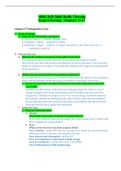-
1. Exam (elaborations) - Nurs-6521,advanced pharmacology final exam 2021 graded a
-
2. Exam (elaborations) - Nurs-6630n
-
3. Exam (elaborations) - Nurs 6560
-
4. Exam (elaborations) - Nurs 5366 / nurs5366 module 3 quiz graded a
-
5. Exam (elaborations) - Nurs 5366 principles of research in nursing
-
6. Other - Nurs 6670 final exam study guide chapter 1 to 39;graded a
-
7. Exam (elaborations) - Nurs 6501 advanced pathophysiology midterm & final exam
-
8. Exam (elaborations) - Nurs 6501 advanced pathophysiology 2021 graded a
-
9. Exam (elaborations) - Nurs-6501n-16,advanced pathophysiology.2020 summer qtr 06/01-08/23-pt27
-
10. Exam (elaborations) - Excelsior college nurs 104 final exam 1. 2021/2022. 100% correct
-
11. Exam (elaborations) - Nurs6501 / nurs 6501: advanced pathophysiology final exam version 1 (latest 2020 / 20...
-
12. Exam (elaborations) - Nurs6501 / nurs 6501: advanced pathophysiology final exam version 1 (latest 2020 / 20...
-
13. Exam (elaborations) - Nu211/nur2115 section 02 fundamentals of professional nursing - online - 2017 fall qu...
-
14. Exam (elaborations) - Nu211/nur2115 section 02 fundamentals of professional nursing - online - 2017 fall qu...
-
15. Exam (elaborations) - Nurs-6512n-27,advanced health assessment
-
16. Exam (elaborations) - Nurs6521n midterm exam questions and answers graded a{latest]
-
17. Exam (elaborations) - Nurs-6521n-20,advanced pharmacology
-
18. Exam (elaborations) - Nurs-6521n-56,advanced pharmacology
-
19. Exam (elaborations) - Nurs-6521n-14,advanced pharmacology
-
20. Exam (elaborations) - Maternal child nursing care 2nd edition ward hisley test bank
-
21. Exam (elaborations) - Nurs 6521 week-3 quiz, nurs 6521 advanced pharmacology,
-
22. Exam (elaborations) - Nurs 5315 pathophysiology | the biologic basis for disease in adults and children 8th...
-
23. Exam (elaborations) - nurs 6512, week 6 midterm exam 2021/2022{a grade}
-
24. Exam (elaborations) - Nurs 406 capstone mental health assessment
-
25. Exam (elaborations) - Nurs 406 -assessment quiz - nursing care of children
-
26. Exam (elaborations) - Nurs 6501 midterm exam review guide.
-
27. Exam (elaborations) - Nurs 4465 vulnerable population fema test and answers mod 4
-
28. Exam (elaborations) - Nurs 500 nursing research test bank all in one
-
29. Exam (elaborations) - Nurs 3620 adult health 1
-
30. Exam (elaborations) - Nurs 132 exam 4 practice questions
-
31. Exam (elaborations) - Nurs 6550 midterm exam questions and answers (graded a)
-
32. Exam (elaborations) - Nurs 6550 midterm exam – question and answers with rationals – walden university
-
33. Exam (elaborations) - Nurs 404 cardiovascular system quiz 2020 – chamberlain college of nursing
-
34. Exam (elaborations) - Nurs 6521 final exam (latest): advanced pharmacology: walden university
-
35. Exam (elaborations) - Nurs -6521n advanced pharmacology
-
36. Exam (elaborations) - Walden university | nurs 6552 women’s health
-
37. Exam (elaborations) - Nurs 406 pharmacology nursing
-
38. Exam (elaborations) - Pharmacology for nurses nurs 406
-
39. Exam (elaborations) - Maryville university nurs 612 final exam 4
-
40. Exam (elaborations) - Nurs 6521 advanced pharmacology final exam latest. walden university
-
41. Exam (elaborations) - Nursing rnsg 2221 jurisprudence questions and 100% correct answers ( answers correctl...
-
42. Exam (elaborations) - Maryville nurs 615 pharm 3 exam with all the correct answers (100% verified 2020/2021...
-
43. Exam (elaborations) - Nurs n521-advanced pharmacology- progress test 4 -with verified answers-2022
-
44. Exam (elaborations) - Nurs-6521 advanced pharmacology2020 exam week 11
-
45. Exam (elaborations) - Nurs-6521n-30-advanced pharmacology final exam - week 11
-
46. Exam (elaborations) - Nurs 6521 advanced pharmacology final exam week 11
-
47. Exam (elaborations) - Nurs-6521n-55, advanced pharmacology exam week 11
-
48. Exam (elaborations) - Nurs 6521 advanced pharmacology final exam
-
49. Exam (elaborations) - Nurs 6521 pharmacology midterm test
-
50. Exam (elaborations) - Nurs-6521c-2/nurs-6521n-2/nurs-6521d-2-advanced pharmacology2020 exam week 7
-
51. Exam (elaborations) - Nurs-6521n-32 advanced pharmacology.2019 exam
-
52. Exam (elaborations) - Nurs 6531 midterm exam review (week 1-6)
-
53. Exam (elaborations) - Nurs 6541 midterm exam
-
54. Exam (elaborations) - Nurs 6541 final may 2020 exam graded adownload to score a
-
55. Exam (elaborations) - Nurs 6541 week 6 quiz exam 2022 graded amid term exam
-
56. Exam (elaborations) - (answered) nurs 6630 week 8 assignment 1: short answer assessment 2022.
-
57. Exam (elaborations) - Nurs 661 exam 2 questions and answers graded a+
-
58. Exam (elaborations) - Nurs 629 exam 2 mvu latest questions and answers
-
59. Exam (elaborations) - Nurs 629 exam 2
-
Show more




